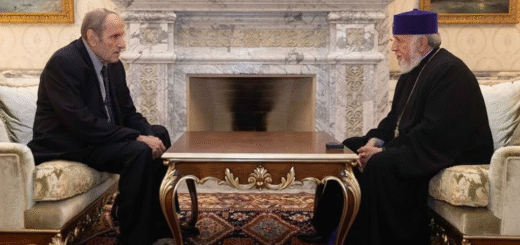Israeli Company threatens Armenian presence in Jerusalem

JERUSALEM, Holy Lands — The Armenian presence in Jerusalem dates back many centuries. Various archaeological excavations have revealed ancient Armenian churches and mosaics in the city. This presence was initially established under the Armenian King Tigranes II, who ruled over Syria and the Holy Lands approximately between 83-69 BC. After the Armenian Church adopted Christianity as its official religion in 301 AD, Armenians began arriving in Jerusalem as pilgrims, with some deciding to settle permanently. Over time, this presence manifested in the Armenian Quarter, which expanded along the path of St. James Cathedral, particularly after the seventh century AD.
The Armenian Quarter today constitutes roughly 14% of Jerusalem’s Old City. It is home to Armenian families, as well as theology students and monks affiliated with the Brotherhood of St. James. However, in 2023, reports surfaced of a controversial deal involving the leasing of approximately 25% of the Armenian Quarter to an Israeli company to construct a seven-star luxury hotel in a part of the quarter. Since then, residents and their supporters have launched legal campaigns to protect their homes and historic landmarks.
In their effort to save the Armenian Quarter, two young activists, Hagob Djernazian and Setrag Balian Jr, have taken their campaign to Geneva, seeking to annul the suspicious and unlawful real estate deal that threatens to destroy the historic heart of Jerusalem. During a public meeting held at the Armenian Center in Troinex, near Geneva, Djernazian and Balian emphasized the significance and richness of the Armenian presence in the Holy City. They stated; “We have conducted more than 400 interviews with international media outlets,” adding that their struggle to save the Armenian Quarter is still ongoing.
The case is fraught with complications. The Armenian Patriarchate does not have the right to sell or lease the property, as it is an endowment administered by the Patriarchate on behalf of the Armenian community. Meanwhile, the background of the Israeli company Xana Gardens has raised serious doubts locally. The company was reportedly established just one day before the contract was signed, has no experience in hotel construction or management, and is owned by a parent company called Xana Capital, registered in Israel and the United Arab Emirates. The company’s main backer is Australian businessman Daniel Rothman.
Protests have intensified and gained momentum after the company sent construction equipment to demolish the parking lot on the site and barred residents from using it, escalating pressure on the local community and the families whose children attend Tarkmanchatz School at the Armenian Monastery of St. James.
When the Armenian community rallied against the controversial agreement, the Israeli company Xana Gardens allegedly incited attacks against demonstrators using gang-like intimidation tactics, including sending threatening messages to their mobile phones. These incidents deepened suspicions about the company’s ties to settlers and its possible agenda to alter Jerusalem’s multi-religious character.
In response, the “Save the Armenian Quarter” campaign was launched in May 2023. Activists surrounded the home of Father Baret Yeretsian, Director of the Patriarchate’s real estate office and one of the signatories to the deal. He was later dismissed from his position.
In recent years, extremist Jewish groups have also intensified harassment of Armenians. As Setrag Balian Jr. explained, “These extremists are not our neighbors from the Jewish Quarter — they are a new group coming from the settlements surrounding Jerusalem, known as the Hilltop Youth.”
Both Djernazian and Balian highlighted a structural issue within the Armenian Patriarchate of Jerusalem: despite its historic role representing the Armenian community, it excludes community participation from major decision-making processes. Referring to the ongoing controversy over the so-called “Armenian Garden” (formally known as the “Cow Garden”), Djernazian remarked; “The Patriarchate has made a decision whose consequences we will suffer from for generations.”
Recently, a group of influential Israeli Jewish intellectuals issued a statement calling for the immediate cancellation of the agreement, arguing that it endangers the Armenian presence in Jerusalem. The statement is seen as a positive step toward defending minority rights. Meanwhile, the Armenian diaspora has mobilized globally to support the cause, with a team of Armenian-American lawyers volunteering to represent the community in its legal battle to protect the Armenian Quarter of Jerusalem.
As the Armenian Quarter struggles with threats to its land, it is also facing a severe financial crisis. Since January 2023, the Jerusalem Municipality has demanded that the Armenian Patriarchate pay approximately 21 million Israeli shekels (about $5.7 million) in Arnona property taxes, including on buildings leased by the municipality itself, which had historically been exempt from such taxes.
Bishop Koryun Baghdasaryan, who assumed responsibility for the Patriarchate’s real estate portfolio in January 2023, stated that many of the bills were unjustified, pointing out that the municipality itself owes the Church more than 10 million shekels in unpaid rent dating back to 2017. Although the District Court temporarily halted foreclosure proceedings, hearings have been repeatedly postponed due irregularities and public backlash, leaving the Patriarchate in a state of uncertainty.
Meanwhile, the Armenian community in Jerusalem has endured a wave of harassment. Residents have awoken to find their homes vandalized with graffiti reading “Death to Armenians.” Clergy members have been spat upon and even sprayed with pepper gas. Peaceful demonstrators opposing the settler presence were labeled “terrorists” by police, after confronting extremists shouting “Goyim”—a derogatory term for non-Jews—and “Death to Arabs,” reflecting hostility toward Armenians and other minorities.
Even during the Eurovision Song Contest, Armenians faced mockery. During the live broadcast, an Israeli host commented after Armenia’s performance: “I can’t believe we gave an entire neighborhood in Jerusalem to these people.”
Many observers believe these incidents are part of a broader demographic engineering strategy dating back to 1967, aimed at reshaping East Jerusalem’s population balance—through evictions, demolitions, and legal ambiguity—to reduce the Christian presence in favor of Jewish settlement expansion.





